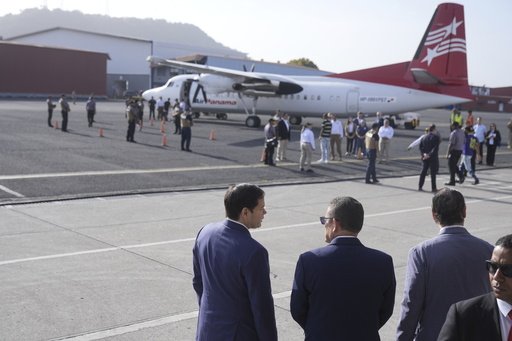
PANAMA CITY — On Monday, U.S. Secretary of State Marco Rubio observed a deportation flight carrying 43 migrants as it prepared to depart from Panama. This event highlights the current administration’s emphasis on curbing migration routes to the United States. The flight, which was part of Rubio’s two-day visit to Panama City during a broader trip to five Central American countries, shifted the discussion to the significant issue of immigration, a central focus for President Donald Trump.
The deportation flight included 32 men and 11 women being returned to Colombia after they had traversed the challenging Darien Gap and were intercepted in Panama. Upon his arrival, Rubio watched the migrants board the plane before moving to a nearby building to address the press. It is uncommon for a Secretary of State to participate in such law enforcement measures while being filmed.
The State Department explained that deportation flights act as a severe deterrent against illegal immigration, revealing that the U.S. has allocated nearly $2.7 million to assist Panama with flights and tickets for deported individuals.
“Mass migration is one of the great tragedies in the modern era,” Rubio stated, acknowledging the complexities and harms faced by individuals involved in migration. He empathized with victims of these circumstances, noting the negative implications for everyone involved.
This particular deportation flight coincided with Trump’s recent threats towards countries refusing to accept deportation flights from the United States. Colombia faced sanctions last week for delaying acceptance of two such flights. In contrast, Panama has demonstrated a willingness to cooperate, facilitating the return of migrants who might otherwise make their way to the U.S.
Panamanian President José Raúl Mulino reiterated his government’s commitment to immigration management and announced plans to withdraw from China’s Belt and Road infrastructure initiative, following Rubio’s warning about reducing Chinese influence in canal operations to avoid American consequences.
Since entering office last July, the Mulino administration reported having conducted 44 deportation flights, returning nearly 2,000 migrants, predominantly Colombians, with a lesser number from Ecuador. Recent statistics indicate a significant drop, exceeding 90%, in the number of migrants crossing the Darien Gap compared to the previous year, attributed to rigorous control measures in the region.
During the discussions, Mulino extended an invitation to Rubio to utilize an airstrip in the Darien, enhancing cooperation between the U.S. and Panama in dealing with migrant deportation.
It is important to note, however, that Venezuelans have predominantly navigated through the Darien region recently, and Venezuela is not currently accepting return flights from Panama.
Rubio praised Panama’s effective measures in managing migration flows, calling the partnership crucial to addressing the challenges posed by illegal mass migration. He remarked, “It would have been impossible to do without the strong partnership we have here with our friends and allies in Panama. And we’re going to continue to do it.”
Additionally, he acknowledged a familiar understanding in the region about migration patterns: “We also understand from the United States that most people who come in here have as a goal, eventually making it to the United States,” signifying that the approach to the border begins not just at the physical borders but involves factors much farther south.
Upon concluding his visit to Panama, Rubio proceeded to El Salvador, where immigration will again be a central topic of discussion. Following El Salvador, he plans to visit Costa Rica, Guatemala, and the Dominican Republic.
Rubio’s journey coincides with a broader freeze on U.S. foreign aid and the cessation of programs aimed at combatting illegal immigration and crime in Central America. The State Department indicated that Rubio had approved exceptions for some essential programs within the countries he was visiting, although specific details regarding these waivers were not made immediately available.

